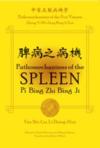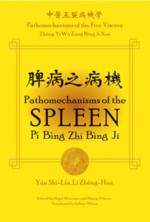SEARCH / BROWSE
Pathomechanisms of the Spleen
YAN Shi-Lin [Other titles by this author]
ISBN: 9780912111841
Paradigm Publications 2010 1st Edition
AU $90.00
Currently Out of Stock Please Inquire for Due Date

Pathomechanisms describe the dynamic process through which disease develops and transforms in the body. While pattern diagnosis provides the practitioner with a snapshot picture of the current state of illness, it is a thorough understanding of pathomechanisms that allows one to predict and prevent the progression of disease. A comprehensive knowledge of the pathomechanisms involved in a given case allows treatment to be more holistic, preventative, and effective. In modern China, pathomechanisms have become a major focus of Chinese medical literature and education. Up to now, relatively little of this material has been transmitted to the West, and consequently many practitioners have failed to go beyond pattern diagnosis to examine the underlying disease process that produces the patterns. Thus, pathomechanisms are often described as a 'missing link' in a Westerner's Chinese medical education. This series of texts devoted to pathomechanisms attempts to bridge this gap so that practitioners may advance their knowledge and reap the rewards of greater clinical success.
Pathomechanisms of the Spleen provides a thorough glimpse into the various manifestations of spleen disease in Chinese medicine.
Part 1 discusses repletion conditions of the spleen, including spleen qi depression, thought and preoccupation stagnating in the spleen, cold-damp encumbering the spleen, phlegm turbidity obstructing the spleen, food and drink damaging the spleen, and static blood accumulating in the spleen - and spleen fire (yang) exuberance - including spleen channel repletion fire and damp-heat brewing in the spleen.
Part 2 presents vacuity conditions, including vacuity of spleen qi, spleen yang, and spleen yin.
Each pathomechanism is described in detail with references to its historical development, then further differentiated by the specific aetiological factors. Each subsection discusses the origins and development of ideas relevant to this pathology, then gives the various symptoms, treatment strategies, and specific formulas, often with modifications to address the particular symptoms more directly. It is here that the author offers a review of relevant literature, spanning the entire range of traditional medical literature beginning with the early classics. For each text, he gives the specific quotations and then paraphrases and explains it. This provides the reader a sense of the historical evolution as well as the various clinical perspectives on each pathomechanism. At the conclusion of each section, the author summarizes the information in a useful table that differentiates again by aetiology and then lists specific symptoms in each case. The appendices include a section on modern research, a Chinese-English bibliography in alphabetical order (with both classical texts and journal articles on modern research) and a Chinese bibliography organised by stroke number.
255 x 180mm, index, bibliography, footnotes, appendix.
300pp
(For this item please quote stock ID 24304)
Related Subject Areas:
